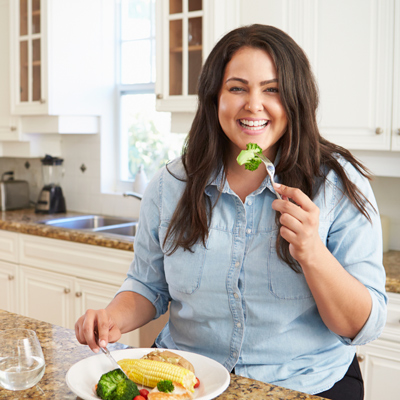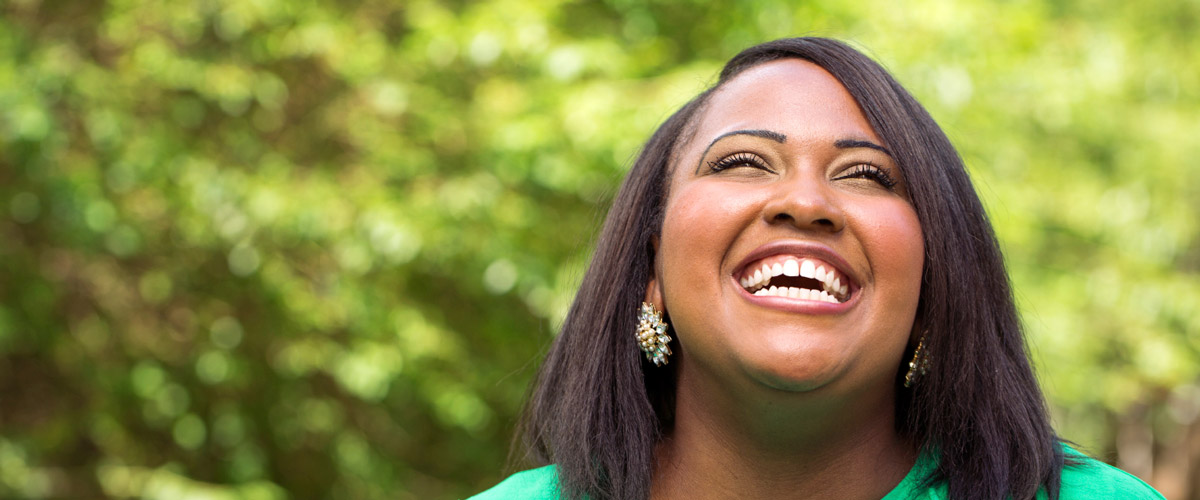New year’s resolution or not, the statistics speak for themselves when it comes to our countries need to have a better relationship with food. Data from 2009-2010 indicates that over 78 million U.S. adults and about 12.5 million (16.9%) children and adolescents are obese. Add to this that the typical American diet exceeds the recommended intake levels or limits in four categories: calories from solid fats and added sugars; refined grains; sodium; and saturated fats. And we don’t do much better in the healthy food department either. Statistics show that Americans eat less than the recommended amounts of vegetables, fruits, whole-grains, dairy products and oils.
It’s obvious that on the whole, our relationship with food needs to change. But how important is it to get it right in your mind first, so that your body can follow suit? “It is really significant how much our brains impacts our eating habits. You have to retrain your brain,” says Jean Rafferty, Licensed Clinical Social Worker specializing in eating disorders. “We have to see how we even develop this relationship. ‘Where did I even learn this?’ and ‘ Where did it first stem from?’”
The best place to start is the family history. “Communication has a lot to do with it. Our history plays a part as does the past behaviour of our family members when it comes to developing food disorders and getting obese. Even in a 600 lb journey, someone is the enabler.”
Once you have identified what contributed to your current state, it’s then time to decide how you move forward from here. Mentally, that is a very different challenge. It’s more than just deciding what goes into your mouth because you are changing why you consume anything in the first place.
Here are some tips that might help you mentally prepare yourself to put up your best fight when you are making decisions about food.
Admit that there may be a problem
 The ol ‘if it ain’t broke then don’t fix it,’ motto applies when it comes to changing your eating habits. In order to feel compelled to make a change, it’s most important to be aware that one is needed. “It’s not self-blame,” says Rafferty. “But until you really accept that maybe you do have a disorder you may not even look for change.”
The ol ‘if it ain’t broke then don’t fix it,’ motto applies when it comes to changing your eating habits. In order to feel compelled to make a change, it’s most important to be aware that one is needed. “It’s not self-blame,” says Rafferty. “But until you really accept that maybe you do have a disorder you may not even look for change.”
Learn to self soothe
For a lot of us, food is the quickest way to pick ourselves up when were down. According to Rafferty half the battle is figuring out another way to get the high we get when we eat. “It’s taking a self inventory and recognizing the relationship,” says Rafferty. “You need to modify it so if you have a craving you find something else to soothe the craving.” This would be a great place to insert your new exercise regime. Even if it’s walking fifteen minutes a day to clear your head. It’s a new way to self soothe, and could eventually end up being the one hour a day that you walk and get the exercise you need for a healthy heart.
Create a vision board
Self soothing without food doesn’t sound like an easy fix, or necessarily the fastest one, but it’s effective and there are tools that can help you get there. “I give people tools, like creating a vision board,” says Rafferty. “A vision board of what it is going to be like to change your relationship with food. Post images of what it is that you want in your life, and how to visualize yourself and the people around you.”
Set the timer when the urge hits
Vision boards are great for the long term, but what can you do if the craving hits right now? “If you have a craving, set the timer and then stall the urgency by redirecting and doing something else,” says Rafferty. “Try it first for 5 minutes, then 10, 15, 20 until you feel like you have a little bit more control or skill to redirect. Before I want to go grab that food ‘can I craft? Can I knit? Crochet?’ With any addiction, the same part of your brain lights up. For heroine, for alcohol, anything in the moment that is going to give you that boost.” Find a replacement!
Talk to a therapist
 Having an objective professional guide you through your thoughts and help you redirect your decisions for the better is very effective. “I often recommend seeking out psychotherapy,” says Rafferty. “If you feel that you can’t do it on your own, a professional can normalize it for you and help you initiate more positive changes. They can help you figure things out like ‘Is this relationship serving me or hurting me?’ What’s the gain?’ If it’s not a gain, you need to redirect and separate and have healthier people in your life just like it would be to enter healthier food into your life.”
Having an objective professional guide you through your thoughts and help you redirect your decisions for the better is very effective. “I often recommend seeking out psychotherapy,” says Rafferty. “If you feel that you can’t do it on your own, a professional can normalize it for you and help you initiate more positive changes. They can help you figure things out like ‘Is this relationship serving me or hurting me?’ What’s the gain?’ If it’s not a gain, you need to redirect and separate and have healthier people in your life just like it would be to enter healthier food into your life.”
Clear your life of toxic people
A psychotherapist can be helpful when it comes to choosing who you want to keep in your inner circle. Asking your friend if you should keep them around, clearly won’t work. But a professional can help guide you to decide rationally, why someone is worth your time and whether they are helping you or hindering you. “Sometimes we stay around people who don’t support what we’re doing,” says Rafferty. “If you’re an alcoholic, why would you want to be hanging out with a toddler? You’d want to be hanging out with people who like to party. Well, if you’re with people who like to eat and you’re on a diet, if they say ‘oh, you can start tomorrow’ those aren’t really supportive people – those are negative people. Even if they don’t realize their intentions aren’t that good.”
Sometimes the effect of the people around you can be subtle. It could be as simple as someone telling you you’re nuts for seeing a therapist when all you need to do stop eating chocolate. “You’re not crazy to see a psychotherapist,” says Rafferty. “Sometimes it’s really the most important thing you can do to take care of you. I tell people sometimes the healthiest people will show up in my office because they at least recognize that they need to take some kind of action. That’s where there is accountability too. Because no matter what, you really have to be accountable for the decisions that you make. The psychological component is so high that if you don’t get in a healthy mental place or have the strength to change, regain will happen. The habit will come back, the habit is related to our brain.”




